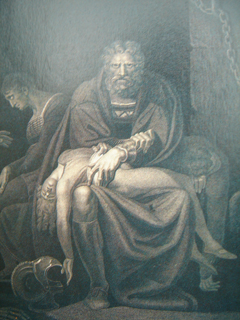This week’s picture is an apposite albeit somewhat grisly choice for Father’s Day – a depiction of Count Ugolino imprisoned with his sons, on whose corpses (some believe) he fed during his last days of life. The work in question is a line engraving by Moses Haughton, based on a painting by Henry Fuseli which enjoyed something of a succes de scandale when first exhibited in London in 1806. Fuseli’s painting is sadly lost; but Haughton’s engraving gives a pretty good idea of its dark and self-consciously morbid character.
The story of Count Ugolino is told in Dante’s Inferno. In the lowest circle of Hell the poet sees two spirits trapped in ice, one of whom is gnawing on the head and brain of the other. He asks what sins they had committed to have earned the eternal punishment of having to commit and suffer cannibalism in this way. Raising his mouth from his disgusting meal, the sinner wipes his lips on his victim’s hair and tells his tale. In mortal life he had been Count Ugolino, a Pisan nobleman, sworn enemy of Archbishop Ruggieri, now his partner in damnation. Betrayed by the Archbishop, he and his sons were imprisoned in a tower and progressively starved to death. Seeing their father gnaw at his own hands, in an anguish which they mistook for hunger, his children offered them their own flesh as sustenance, but he declined, watching them die one by one.
Finally, Ugolino recounts, “their griefs / Were ended. Blindness now had seized my eyes / But no relief afforded. I saw not / My sons, but grop’d about with feeble hands / Longing to touch their famish’d carcases, / Calling first one, then t’other by their names, / Till after two more days what grief could...


